126 - Testing Times
Thursday, November 27, 2014
It was hard to remember exactly why I was doing this. Arriving in the patio, the place seemed full of Italian teenagers. The only two adults in view were their teachers. It seemed as though I would be the only "mature student" taking the DELE Spanish exam. One by one they emerged in varying states of nervous excitement and reported back on what the topic had been for their 15-minute oral exam.
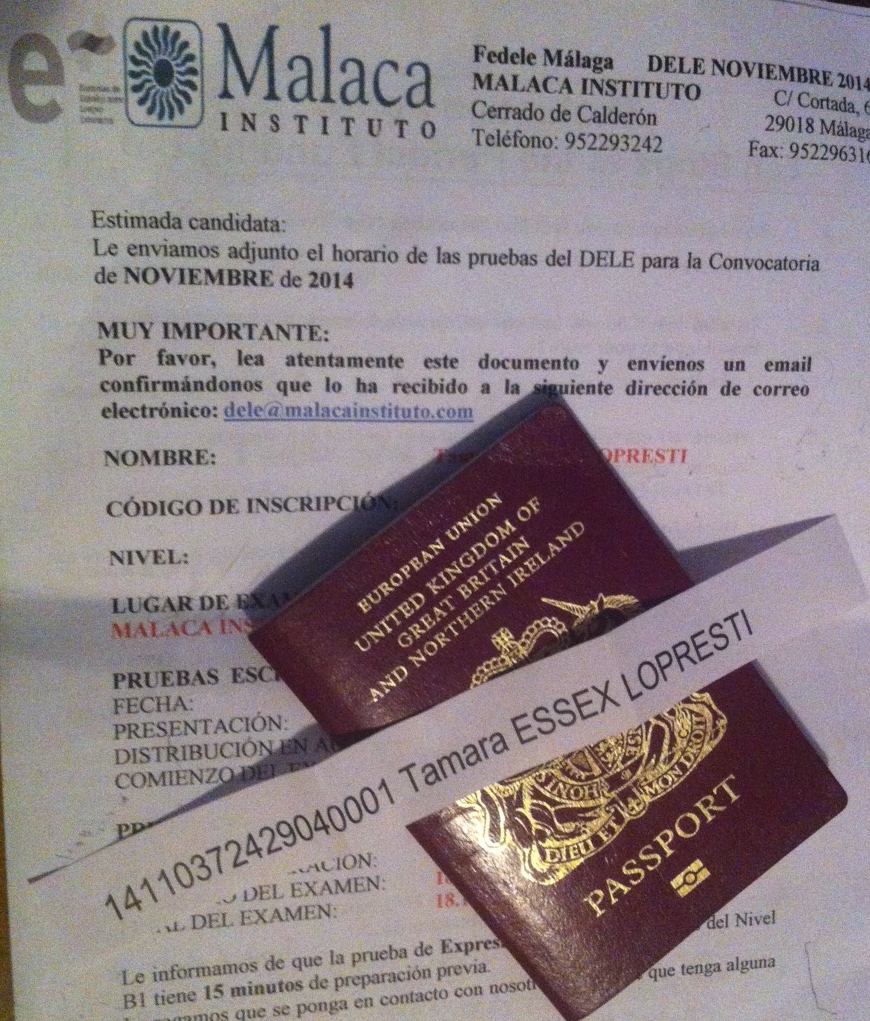 As the clock crept inexorably towards 5.45 I was called into the "holding pen", my passport checked to prove I hadn't sent a Spanish friend in to take the oral exam for me, and I was offered six cards, face down, from which to choose two. My random choices were "Talk about your favourite sport" - errrrrm, no thank you! Or "Talk about a famous person you'd like to meet". OK, that one then. As the clock crept inexorably towards 5.45 I was called into the "holding pen", my passport checked to prove I hadn't sent a Spanish friend in to take the oral exam for me, and I was offered six cards, face down, from which to choose two. My random choices were "Talk about your favourite sport" - errrrrm, no thank you! Or "Talk about a famous person you'd like to meet". OK, that one then.
Out on the patio of Málaca Institute (the testing centre for DELE, the Diploma de Español como Lengua Extranjera) the group from southern Italy seemed mostly to have done the "famous person" topic too. The last girl in before me had talked about Madonna, and two earlier girls had talked about the recent winner of the Italian X-Factor.
Then I was ushered through to the exam room. A lovely examiner was kind and reassuring but in my confusion I failed to catch her name. She introduced me to the other examiner, Ramón, who would sit behind me out of sight making notes of all my errors. "¡Ramón no existe!" she said. Ramón doesn't exist. But his pen was ready to record every shameful stumble.
A bit of chat to relax the candidate. She asked why I was studying Spanish. I explained that I live here so need the language for day-to-day living but was doing the exam purely for fun. I thought I saw one of her eyebrows twitch slightly. I told her that it had seemed like fun, up until about five minutes ago. Then we were onto the task. She asked which topic I had chosen. "Una persona famosa" I replied. I'm convinced her shoulders slumped. "Vale" she sighed.
I started by saying that in the first place I don't admire someone or want to meet them merely because they are famous. Her eyebrow twitched and stayed slightly raised. I then said I was going to speak about the politician 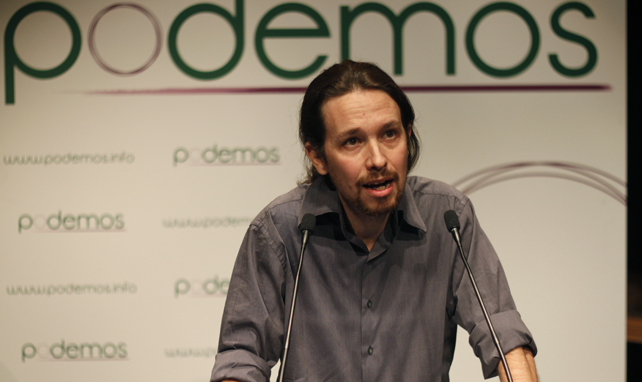 Pablo Iglesias. The second eyebrow rocketed skywards and both disappeared under her fringe. The task was to say a bit about him and why he is famous. I added a mini-history of Podemos and its roots (raices) in the peaceful demonstrations of the Indignados in la Plaza de la Puerta del Sol in Madrid in May 2011, mentioning that I had been there that first week as the camp developed, and had taken cartons of juice to the communal kitchen each morning on my way to my Spanish classes. The task is structured so that you have to finish by saying what you WOULD say to the person, in order to force candidates to use the conditional. I strung together some stuff about what I would say and forced in a "Si pudiera hablar con él, le diría ......" (If I were able to speak with him I would tell him .....) to make sure I got the mark. Pablo Iglesias. The second eyebrow rocketed skywards and both disappeared under her fringe. The task was to say a bit about him and why he is famous. I added a mini-history of Podemos and its roots (raices) in the peaceful demonstrations of the Indignados in la Plaza de la Puerta del Sol in Madrid in May 2011, mentioning that I had been there that first week as the camp developed, and had taken cartons of juice to the communal kitchen each morning on my way to my Spanish classes. The task is structured so that you have to finish by saying what you WOULD say to the person, in order to force candidates to use the conditional. I strung together some stuff about what I would say and forced in a "Si pudiera hablar con él, le diría ......" (If I were able to speak with him I would tell him .....) to make sure I got the mark.
Then a five-minute interview on the same theme (in which we agreed that the "celebrities" who go into reality shows are so often the girlfriend or mother of a celeb rather than having any particular talent of their own), the description of a photo, a final dialogue about her being my house-sitter ("Mi casa es tu casa") and ya esta, all done. Phew! Why am I doing this???
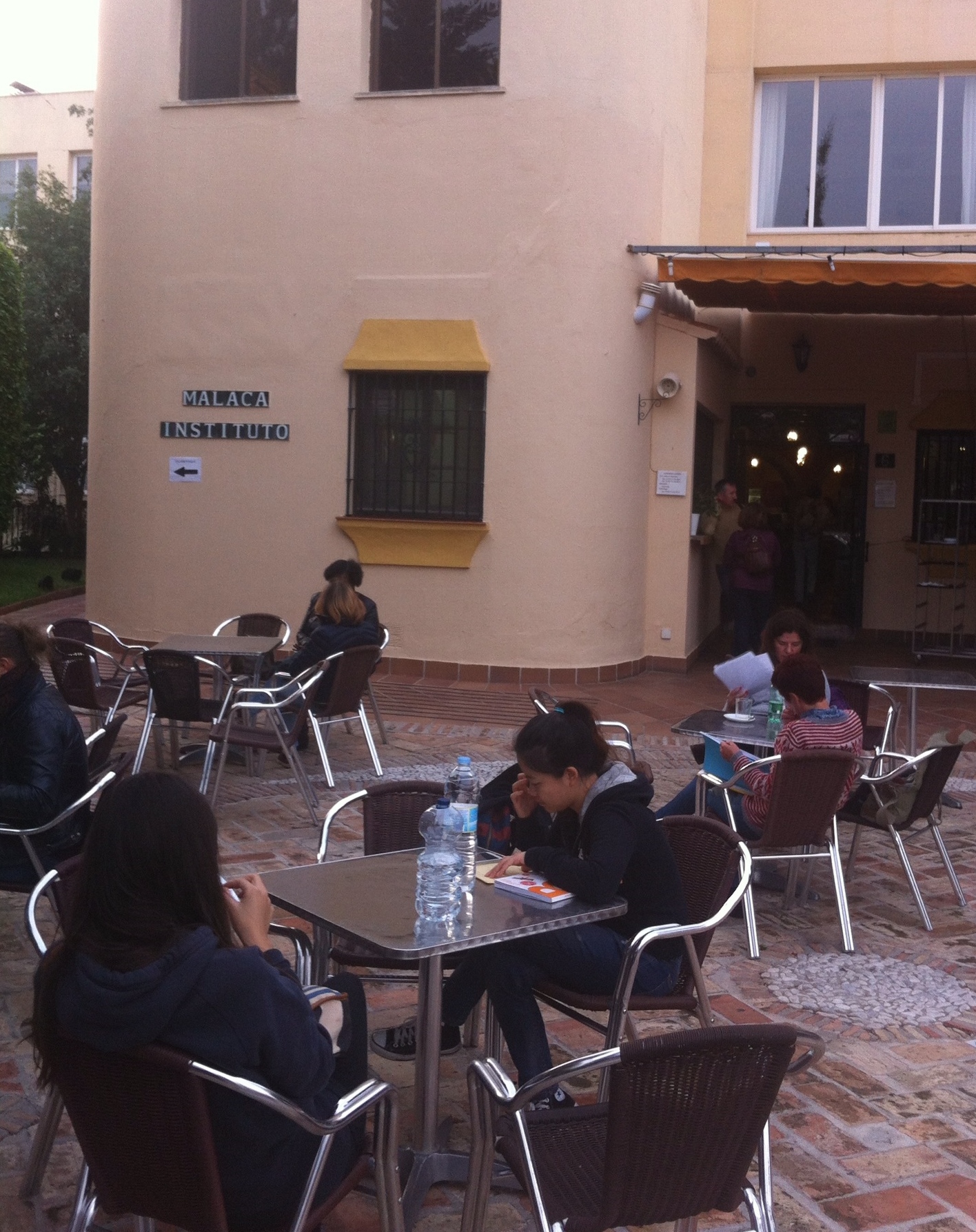 Back out in the patio the Italian girls asked me how it had gone. I couldn't remember much. Now more adults were gathering for their oral exam, and I shared what little I could recall about the structure. The college café was doing a roaring trade - coffee to boost the energy or calm the nerves! We were nine at our table, chatting about the exam and the topics, working out the details for Saturday's longer written tests, and hearing about the intensive courses people had done in the month leading up to the exam. Two of the adults needed the B1 level for their work. The rest of us were doing it for fun. We laughed, agreeing we must be mad. Why on earth were we doing this??? Back out in the patio the Italian girls asked me how it had gone. I couldn't remember much. Now more adults were gathering for their oral exam, and I shared what little I could recall about the structure. The college café was doing a roaring trade - coffee to boost the energy or calm the nerves! We were nine at our table, chatting about the exam and the topics, working out the details for Saturday's longer written tests, and hearing about the intensive courses people had done in the month leading up to the exam. Two of the adults needed the B1 level for their work. The rest of us were doing it for fun. We laughed, agreeing we must be mad. Why on earth were we doing this???
Chatting, sharing tips, relaxing. Joking about the ways we had forced subjunctives and conditionals into the exam. Linked by a common language, which for none of us was our own. The Iranian woman and another from the Faroe Islands. The young lad from France now living in Switzerland. The Italian teachers, over to guide their young charges through the exams. Two Chinese women, a Russian man, and me. Chatting, sharing our histories, the varying routes from all corners of the world, the journeys - both literal and metaphorical - that had brought us all on the same day to this one patio at a language school in Málaga. The Spanish language was the key that removed the barriers between us all. Then it all became clear. THAT was why we were doing it.
© Tamara Essex 2014 bbbbb http://www.twocampos.com
THIS WEEK’S LANGUAGE POINT:
All the guidelines, and all the teachers, made it clear that several conditionals and a couple of subjunctives needed to be "forced" into all parts of the exam in order to achieve the B1 level. I know I use it, genuinely without thinking, in many settings. "Espero que nos veamos pronto", "Si, cuando quieras", "Pues, dime cuando sepas" and loads more normal everyday phrases. And I made absolutely sure I had produced it a dozen times in the exam.
All well and good. Until the FINAL line on the FINAL part of the oral exam. The "casual chat" about the examiner house-sitting for me. I'd told her that IF it were to become very sunny the plants WOULD need watering (whoop whoop third conditional!) and that she could eat what was in the fridge. The closing line should have been easy. "When I get back, could you leave me a litre of milk?". When I get back. That uses "cuando" in the future. That's subjunctive. I can do that.
"Cuando ..... ummm. Cuando regreso ..... no, lo siento. Cuando ..... errrrr, cuando regresaré. No, no es el futuro, lo siento. Cuando ..... momentito por favor. Puedo hacerlo. Cuando ..... cuando regresa ..... ¡Uy! Vale, el verbo es regresar. ¡Vaya! Yo lo tengo. Cuando regrese .... ¡¡¡CUANDO REGRESE!!!" Fortunately she was laughing with me, and she kindly let me struggle through until I got there. I sneaked a look at Ramón (who didn't exist). He was laughing too. And I think he'd put his pen down.
 1
Like
Published at 2:58 PM Comments (2)
1
Like
Published at 2:58 PM Comments (2)
125 - What Can 5€ Buy?
Thursday, November 20, 2014
The thing was, she didn't ask for money. She asked for food. Well, technically, she asked for leftovers, scraps. What we had pushed aside. She politely waited in the shadows, almost out of sight, until we seemed to have finished. She stepped forward, apologised for interrupting our meal, and asked if we would allow her to eat the off-cuts and remnants on our plates. She hadn't eaten for three days.
"No" we replied, adding quickly "but if you'll sit down awhile you can order what you want and it can go on our bill." She frowned - it took her a moment to process what was being offered. She perched on the edge of a chair, pulling it slightly away from the table, unwilling to "spoil" our evening. I offered her the menu but she waved it away and asked the waiter for a plate of couscous, glancing at me for permission or confirmation. "Y algo para beber" I added (and something to drink). A bottle of water.
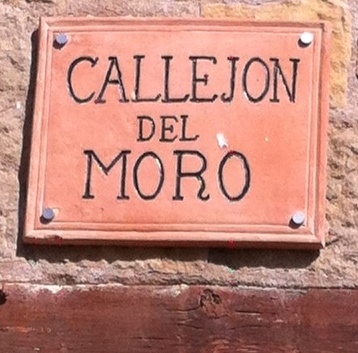 While she waited, we asked her a bit about herself, without wanting to pry. She spoke hesitantly, it appeared as though she didn't want to bore us. Her Spanish was clear and fluent. She spoke four languages, which anywhere else would make her highly employable, but here in Melilla it's a common skill. Spanish, Rif-Berber, French and Arabic, hugely impressive to me, working hard to gain a decent level in a second language, but here it is nothing that would help her find work. While she waited, we asked her a bit about herself, without wanting to pry. She spoke hesitantly, it appeared as though she didn't want to bore us. Her Spanish was clear and fluent. She spoke four languages, which anywhere else would make her highly employable, but here in Melilla it's a common skill. Spanish, Rif-Berber, French and Arabic, hugely impressive to me, working hard to gain a decent level in a second language, but here it is nothing that would help her find work.
She'd had a difficult past, but the future was hers to shape if she just had a chance. Unfortunately that night she could only think in the short-term. Her evident hunger temporarily addressed, her thoughts turned to her next problem. With obvious shame, she plucked up the courage to ask a further favour. Diffidently she explained that the hostal required 5€ or they wouldn't let her stay.
 The irony of the figure was not lost on us and brought a wry smile to our faces. We had crossed the border from Melilla into Morocco earlier that day. There are no official currency-exchange offices, and on the advice of a Guardia Civil friend we had gone into one of the cross-border trading posts where 20€ bought us 220 dirhams. Returning six hours later, our remaining 60 dirhams seemed almost worthless. The friendly trader of the morning with whom we'd chatted awhile had closed. We almost didn't bother - what luxury to be so thoughtless with money! We could have kept the dirhams - exotic, brightly-coloured notes. The irony of the figure was not lost on us and brought a wry smile to our faces. We had crossed the border from Melilla into Morocco earlier that day. There are no official currency-exchange offices, and on the advice of a Guardia Civil friend we had gone into one of the cross-border trading posts where 20€ bought us 220 dirhams. Returning six hours later, our remaining 60 dirhams seemed almost worthless. The friendly trader of the morning with whom we'd chatted awhile had closed. We almost didn't bother - what luxury to be so thoughtless with money! We could have kept the dirhams - exotic, brightly-coloured notes.  At the last moment we dived into a liquor store and queue-jumped a line of Moroccan youngsters visiting Spain for the evening to buy beer and to sit in the park drinking and chilling. The manager grabbed the 60 dirhams and passed over a well-travelled 5€ note which was shoved into a trouser pocket and almost forgotten - unimportant, almost worthless to us, until late that night it paid for a homeless young woman to sleep safely in a hostel. At the last moment we dived into a liquor store and queue-jumped a line of Moroccan youngsters visiting Spain for the evening to buy beer and to sit in the park drinking and chilling. The manager grabbed the 60 dirhams and passed over a well-travelled 5€ note which was shoved into a trouser pocket and almost forgotten - unimportant, almost worthless to us, until late that night it paid for a homeless young woman to sleep safely in a hostel.
© Tamara Essex 2014 http://www.twocampos.com
THIS WEEK'S LANGUAGE POINT:
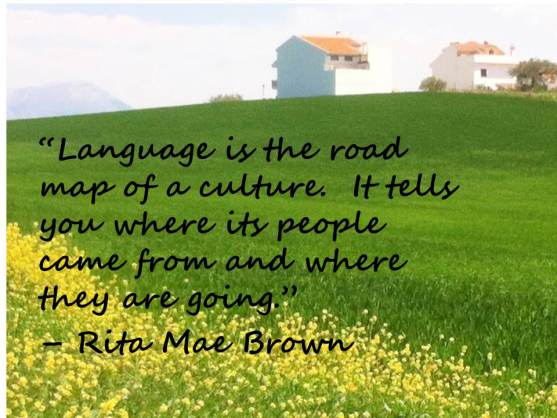 This is exam week, and I’m trying to get over the block that hits me when confronted with a topic to speak about! I learned a lovely phrase to produce when struck dumb … “Tengo la cabeza a las tres y cuarto!” It means that I’ve gone blank and can come up with nothing (should come in handy!). This is exam week, and I’m trying to get over the block that hits me when confronted with a topic to speak about! I learned a lovely phrase to produce when struck dumb … “Tengo la cabeza a las tres y cuarto!” It means that I’ve gone blank and can come up with nothing (should come in handy!).
It’s the teeny little words I trip up on.
“La ropa se seca AL sol” is correct, not “en el sol”. Very English – to dry IN the sun, but wrong in Spanish.
“Es más grande QUE mi casa” is correct, not “DE mi casa”
Remembering to change Y to E before a vowel, as in “cerca de una sauna E una pastelería”.
“Tuve mucha suerte EN encontrarlo” is correct, not A encontrarlo.
“Te deseo toda la suerte DEL mundo” is correct, not EN EL mundo.
“Mi primer día EN MI escuela” is correct, not A MI escuela.
No rules for these, unfortunately – they just need learning!
 0
Like
Published at 10:48 AM Comments (6)
0
Like
Published at 10:48 AM Comments (6)
124 - Season of Mist & Matanza
Thursday, November 13, 2014
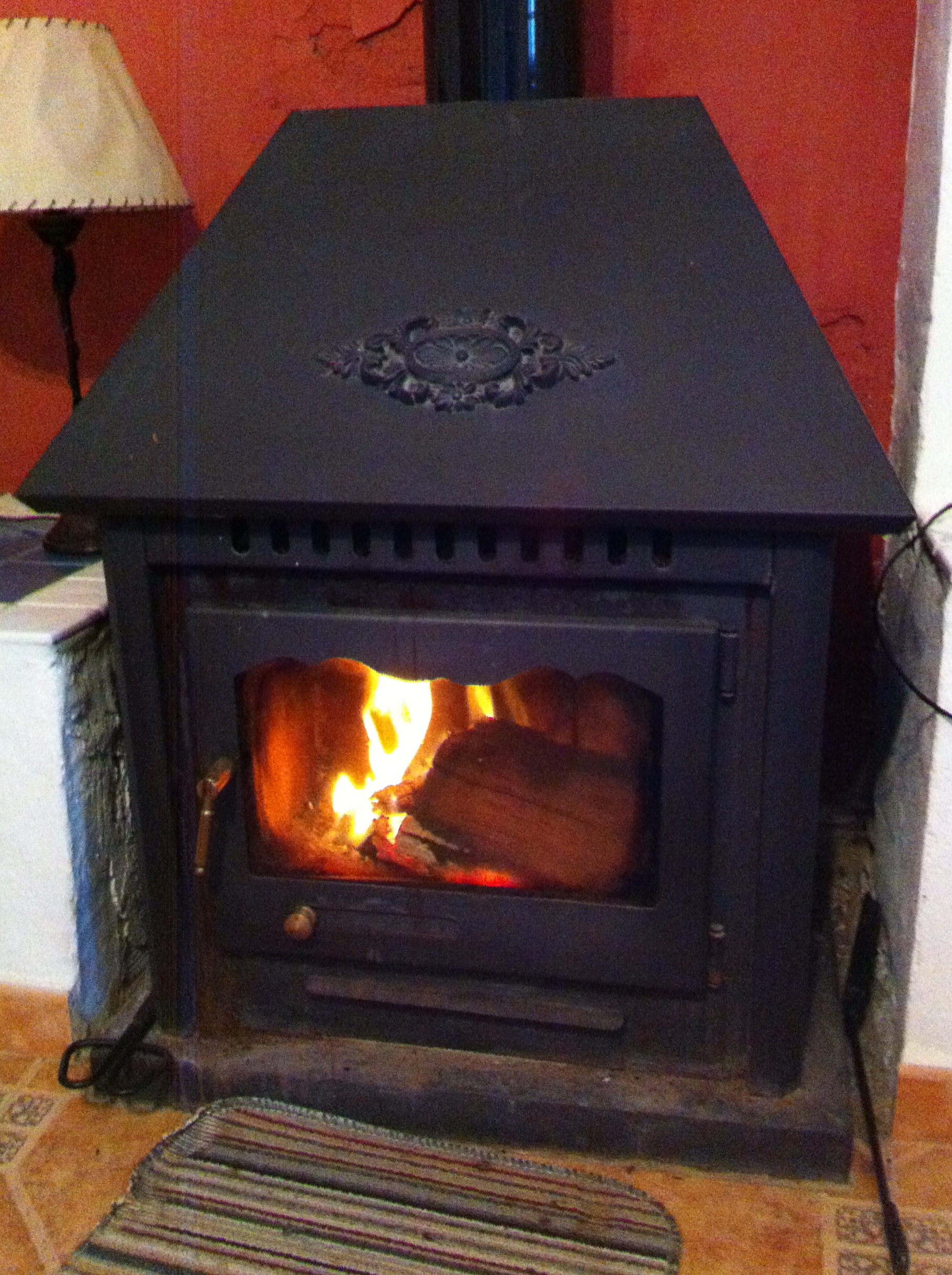 Autumn has blown in with a vengeance. After a balmy October, the wind and the rains of November led to a rush to the wood suppliers, searching in bottom drawers for the warmer duvet, and random jabbing at the air-conditioning controls to work out how to change it to heating. Autumn has blown in with a vengeance. After a balmy October, the wind and the rains of November led to a rush to the wood suppliers, searching in bottom drawers for the warmer duvet, and random jabbing at the air-conditioning controls to work out how to change it to heating.
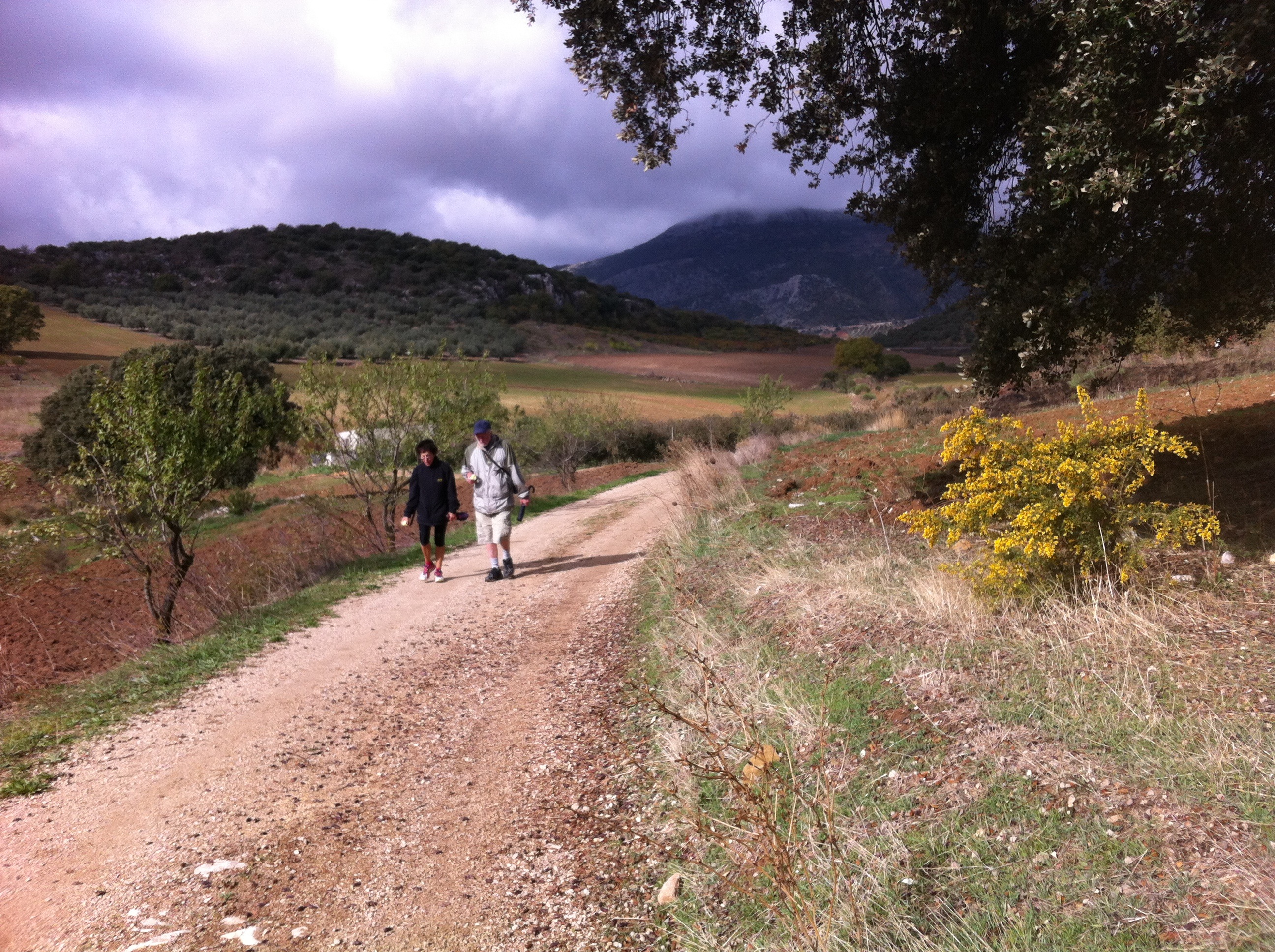 A misty autumn walk with the Sunday group around the glacial basin of Alfarnate. Rich and fertile with its own micro-climate, it is the only place in mainland Spain where cherries and chick peas grow. This was apple season, and the rows of short trees were heavy with fruit (and within reach - ideal for those of us with a cheese sandwich in our rucksacks!). Bright tomatoes too, and artichokes and cabbages. This is good land, farmed professionally, and protected on all sides by the mountains which also give it water. A misty autumn walk with the Sunday group around the glacial basin of Alfarnate. Rich and fertile with its own micro-climate, it is the only place in mainland Spain where cherries and chick peas grow. This was apple season, and the rows of short trees were heavy with fruit (and within reach - ideal for those of us with a cheese sandwich in our rucksacks!). Bright tomatoes too, and artichokes and cabbages. This is good land, farmed professionally, and protected on all sides by the mountains which also give it water.
This Axarquían landscape, with its changing colours and textures, has given up its summer harvests. Now the olive harvest begins, that valuable winter crop, though nearer to home around Colmenar it will be a week or two yet.
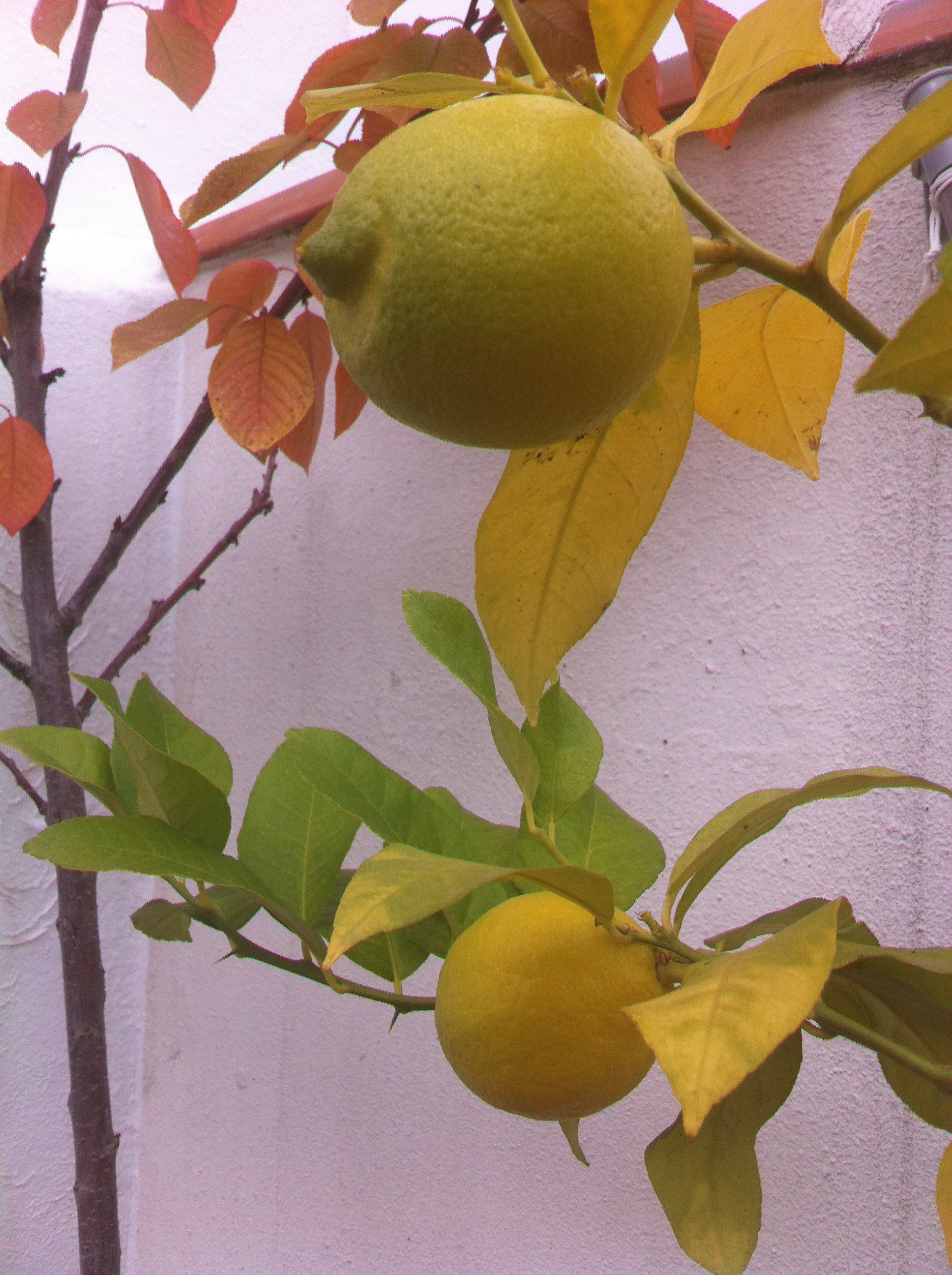 On my terrace, the lemons are finally showing a hint of yellow in the skin. The peppers are finishing, the tomatoes are giving their last few small fruit. The nispero tree is in On my terrace, the lemons are finally showing a hint of yellow in the skin. The peppers are finishing, the tomatoes are giving their last few small fruit. The nispero tree is in 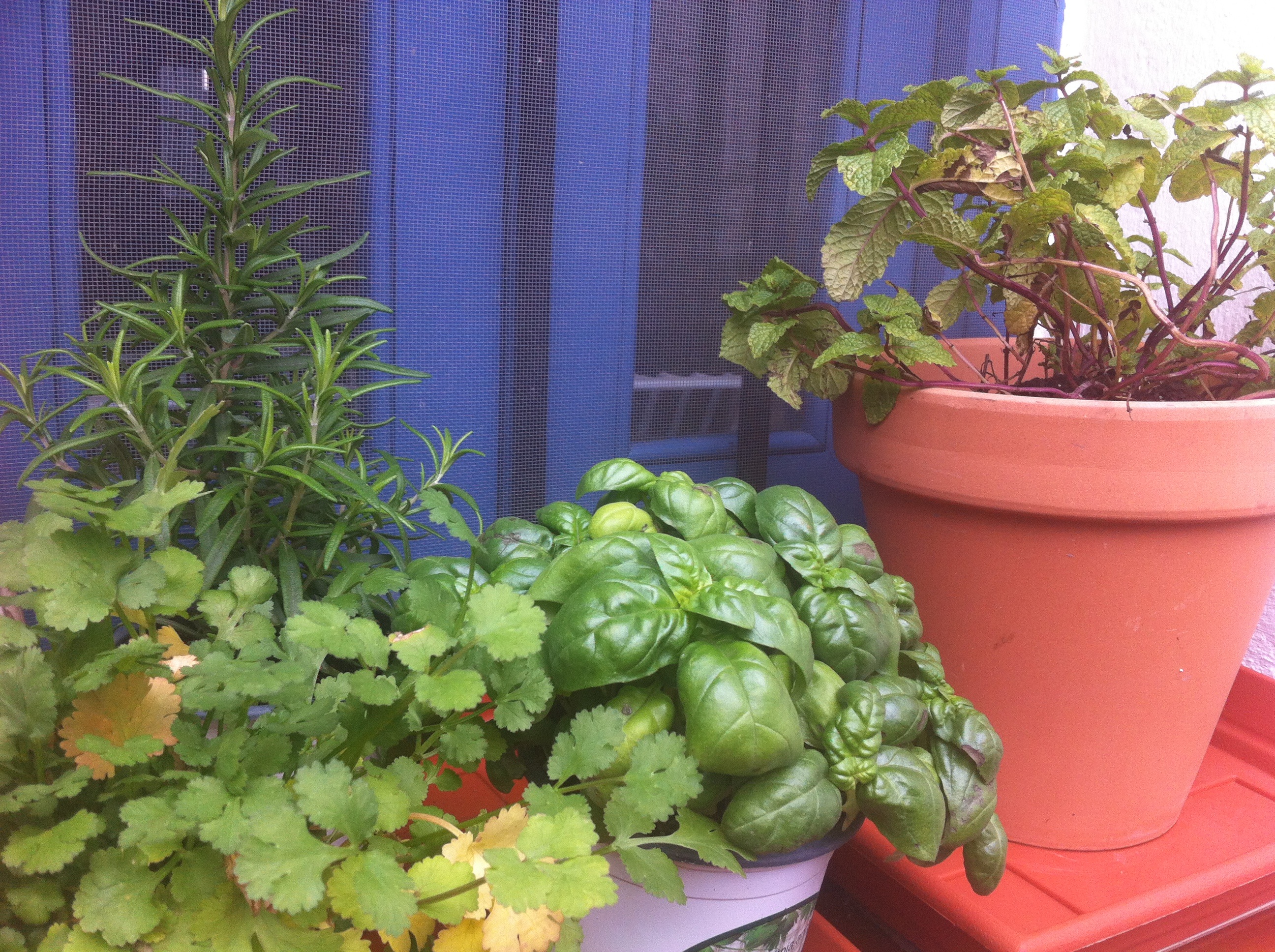 flower so I hope for fruit in the spring. On the kitchen windowsill is coriander, basil, rosemary and mint. The mint makes delicious tea in the tetera I bought in Morocco last month. Basil on tomato salad. Coriander on almost everything, it’s my favourite! flower so I hope for fruit in the spring. On the kitchen windowsill is coriander, basil, rosemary and mint. The mint makes delicious tea in the tetera I bought in Morocco last month. Basil on tomato salad. Coriander on almost everything, it’s my favourite!
And across the street it is el día de la matanza - the day of the killing. The piglet, fattened lovingly all year out at the campo house, is dispatched quickly and portioned in the workshop opposite my study. Huge rubber buckets of one mix for chorizo, and another for morcillo. Bags of paprika are brought out of storage for the chorizo. The sausages will hang in the garage until Christmas and beyond. Three generations of the family work together efficiently, each knowing their role in this important annual event. Every part of the pig is used. Incongruously, the four trotters are neatly laid on the bonnet of the car that the eldest son is fixing. The year of the pig’s life is matched by the year that it feeds the family, padded out with all the fruit and vegetables from their plots. It’s part of the cycle of life in rural Andalucía.
 Each season provides. Chick peas from Alfarnate are made into hummus. The best thing about making your own is being able to put in more garlic than is generally considered to be sociable! A splash of the neighbour’s rough olive oil. Coriander snipped from the window-sill. Fresh, seasonal, local produce. Each season provides. Chick peas from Alfarnate are made into hummus. The best thing about making your own is being able to put in more garlic than is generally considered to be sociable! A splash of the neighbour’s rough olive oil. Coriander snipped from the window-sill. Fresh, seasonal, local produce.
The fields have changed colour. Although up in Alfarnate they are full of vegetables, down here they are brown and ploughed, awaiting the next stage in the farming cycle. New season, new life.
© Tamara Essex 2014 http://www.twocampos.com
THIS WEEK'S LANGUAGE POINT:
The exam is next week. I’m practising with old exam papers, and doing alright in the written and comprehension tests, but struggling a bit with the listening and the oral. So I’m having a couple of lessons at Escuela Cervantes in Málaga which is good practice. All the teachers there have experiences as DELE examiners so it’s ideal.
The problem is having to talk about an unknown topic, while remembering to insert a good few conditionals and subjunctives, plus using past and future tenses. Sigh.
Try it! Talk aloud for four minutes on a topic. I’ve had to ramble …. I mean TALK …. about:
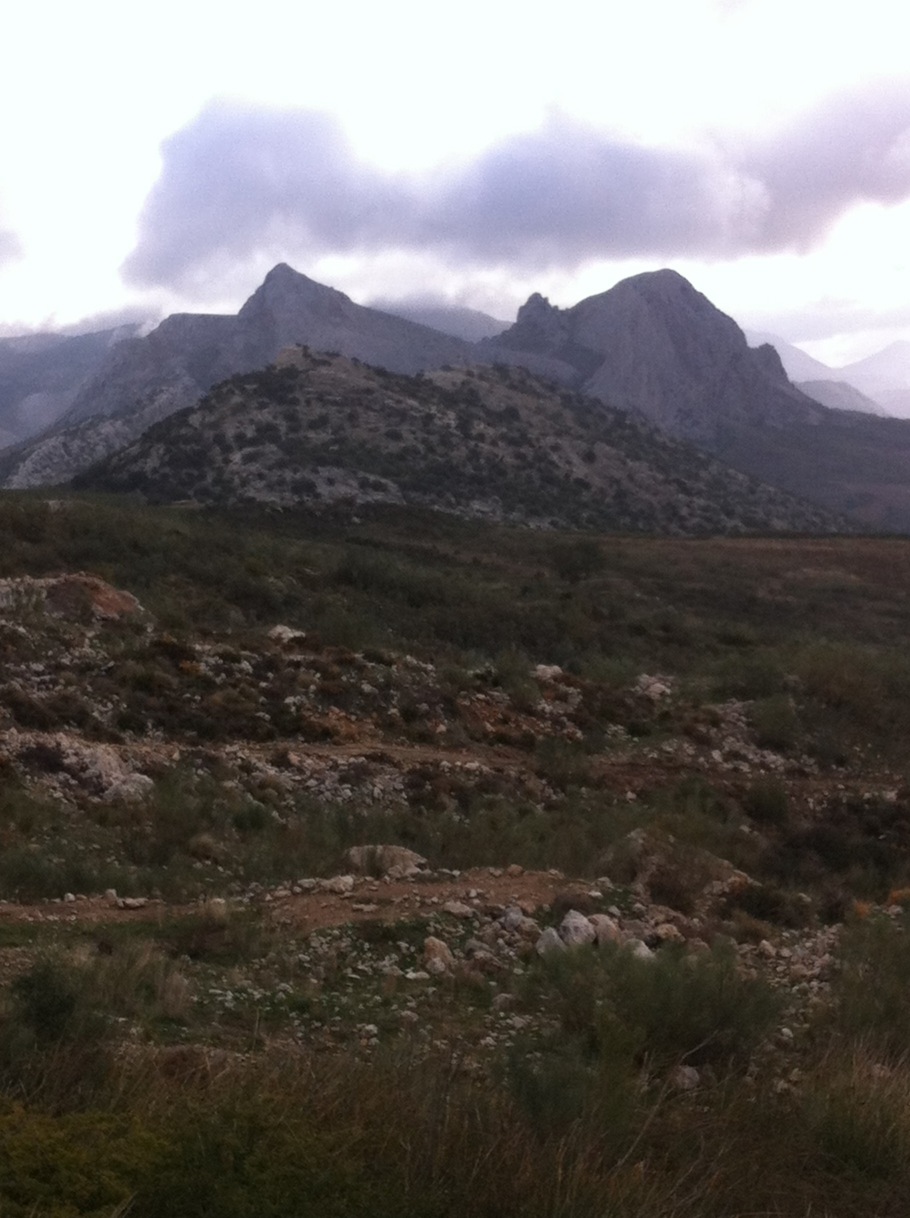 A famous person you’d like to meet and why; A famous person you’d like to meet and why;- What country you might like to live in and why;
- The house of your dreams;
- Your work, what you enjoy about it and what you don’t;
- Your style of dressing (!!!);
- Whether you live a healthy lifestyle or not;
- Environmental issues in your home country and what you should do;
- Mass media;
- How you use your free time.
Jose has helped me to practice some core phrases that I try to work into every theme, which is a great trick – but he is very strict and says I need more practise before the exam. Oh dear.
 1
Like
Published at 3:16 PM Comments (1)
1
Like
Published at 3:16 PM Comments (1)
123 - A Passport to Paradise
Thursday, November 6, 2014
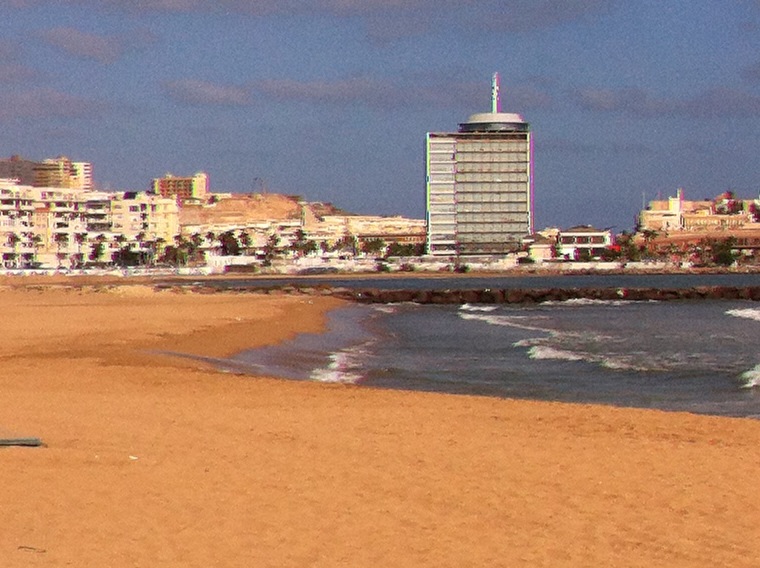 The DVD was in a pretty case. La Oficina de Turismo had spent a fair bit. The little film sang the praises of this beautiful part of Spain - interesting architecture, good restaurants, a casino, pleasant hotels, an ancient fortress, sandy Mediterranean beaches, idyllic scenes. A great place for my birthday weekend. The DVD was in a pretty case. La Oficina de Turismo had spent a fair bit. The little film sang the praises of this beautiful part of Spain - interesting architecture, good restaurants, a casino, pleasant hotels, an ancient fortress, sandy Mediterranean beaches, idyllic scenes. A great place for my birthday weekend.
Promotion over, we flicked across to a Spanish news channel. 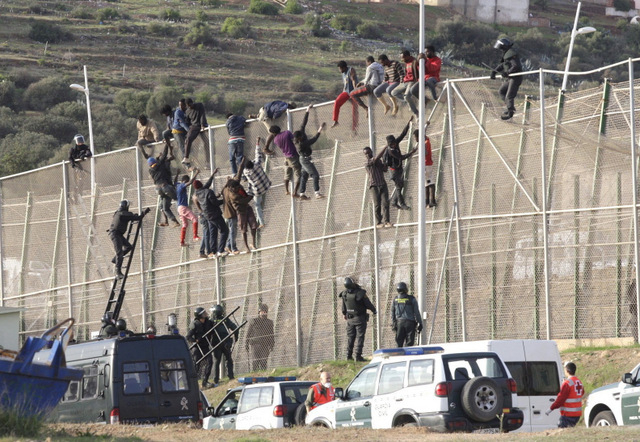 Terrible scenes of border controls under siege. October 22nd. Desperate refugees after travelling thousands of miles, climbing fences, stuck on the "concertina" loops of barbed wire, falling. Almost reaching their goal, almost arriving in Spain, but to a less than welcoming reception. The Guardia Civil's job is to keep them out, to protect the border. Fights ensued. People were injured. Earlier this year, in the same place, people died. Terrible scenes of border controls under siege. October 22nd. Desperate refugees after travelling thousands of miles, climbing fences, stuck on the "concertina" loops of barbed wire, falling. Almost reaching their goal, almost arriving in Spain, but to a less than welcoming reception. The Guardia Civil's job is to keep them out, to protect the border. Fights ensued. People were injured. Earlier this year, in the same place, people died.
So less than a fortnight later here we are in Melilla, in two places at the same time. The site of the promotional DVD, and the site of the news stories. We are simultaneously in two contintents - geographically we are standing in the huge continent of Africa. Politically we are within Spain's borders, so we are in Europe. Melilla - neither one thing nor another, or a strange mixture of both. Destination for tourists, and site of violent border clashes. Two sides to one small place.
And it feels as though we are in two places. The residents are predominantly Spanish Muslims with a multitude of backgrounds and cultures. A small minority are the families of the large corps of Guardia Civil, predominantly Spanish Christians. There are tourists, though not many. Melilla covers less than 5 square miles. It has the beaches, the shops, the restaurants, that the DVD described. But the DVD only used the word "Africa" once - and the implication was that you could VISIT Africa from Melilla, there was no acknowledgement of being physically in the African continent, nor of the fascinating multi-cultural experience that is Melilla.
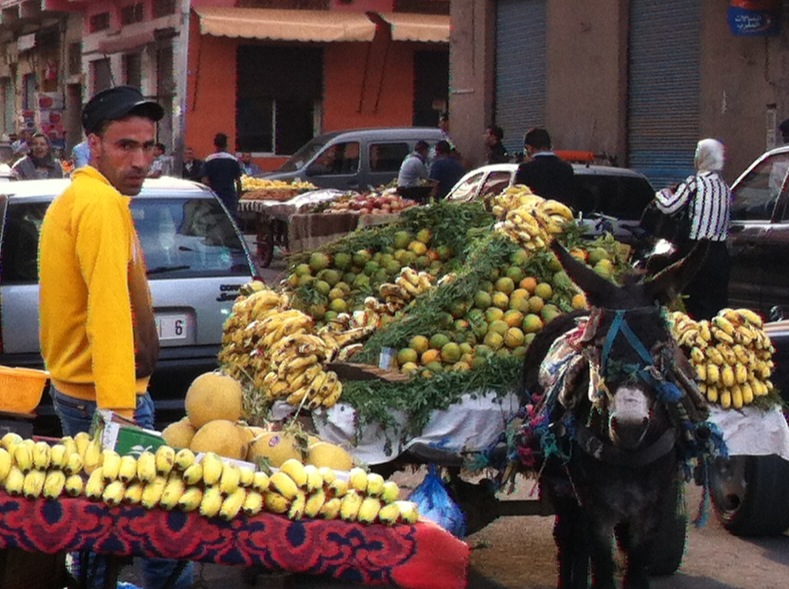 Surrounded on three sides by Morocco, visiting Melilla is the "easy" way to sample Moroccan food and culture, while remaining comfortably in a European, Spanish-speaking, euro-zone country. You can walk through the border controls into Morocco and on the other side a 5€ taxi takes you ten kilometres to Nador, where you can spend a few hours in the souk, fingering rugs and wall-hangings, smelling the spices, tasting the olives, and diving into a tetería to lounge on cushions and drink sweet mint tea, before retreating safely to your European hotel back on the Spanish side of the barbed wire. Surrounded on three sides by Morocco, visiting Melilla is the "easy" way to sample Moroccan food and culture, while remaining comfortably in a European, Spanish-speaking, euro-zone country. You can walk through the border controls into Morocco and on the other side a 5€ taxi takes you ten kilometres to Nador, where you can spend a few hours in the souk, fingering rugs and wall-hangings, smelling the spices, tasting the olives, and diving into a tetería to lounge on cushions and drink sweet mint tea, before retreating safely to your European hotel back on the Spanish side of the barbed wire.
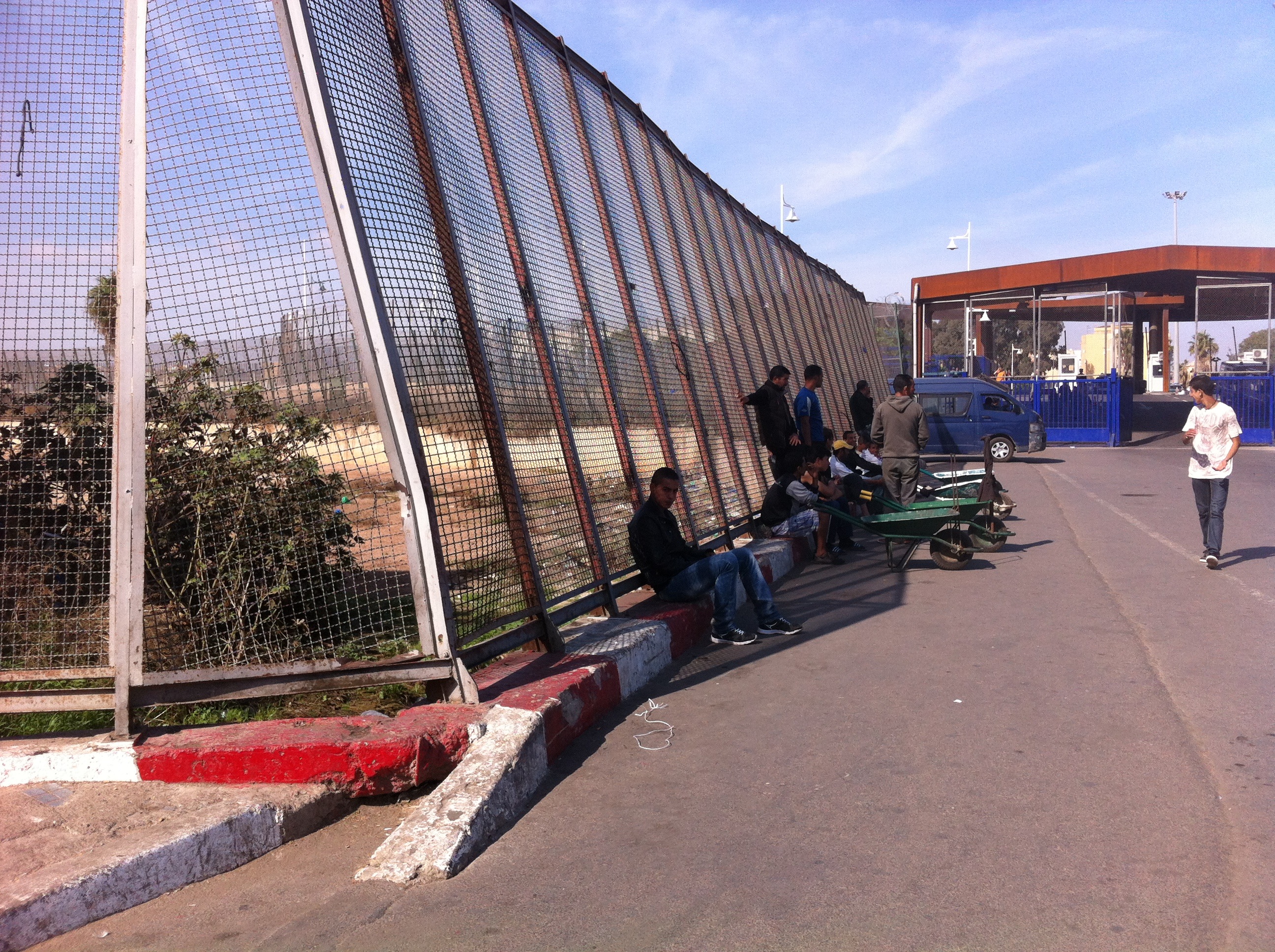 In no-man's land in the border-crossing between Morocco and Spain, enterprising boys sit with wheel-barrows waiting for the women returning from Melilla with their goods to sell in the zoco (souk) of Nador. Biscuits from the Día supermarket, soap, chocolate, some tins, and cartons of milk, to sell from a blanket for a few dirhams profit, enough to scrape a minimal living. Enough to give a boy a dirham to fill his barrow with her bags to take them to the waiting taxis. In no-man's land in the border-crossing between Morocco and Spain, enterprising boys sit with wheel-barrows waiting for the women returning from Melilla with their goods to sell in the zoco (souk) of Nador. Biscuits from the Día supermarket, soap, chocolate, some tins, and cartons of milk, to sell from a blanket for a few dirhams profit, enough to scrape a minimal living. Enough to give a boy a dirham to fill his barrow with her bags to take them to the waiting taxis.
One Moroccan woman had already begun to put her bags into a battered taxi. Unaware, we approached the line of cars, not noticing the driver removing her shopping and putting her back on the pavement in favour of us. Visitors pay 5€ to travel to Nador - she would only have paid 20 dirhams, about 2€. Enough for the driver if no rich tourists are in sight, but we are the better option for him and she is left behind. Only once underway do we piece together the story - too late to offer to share our ride.
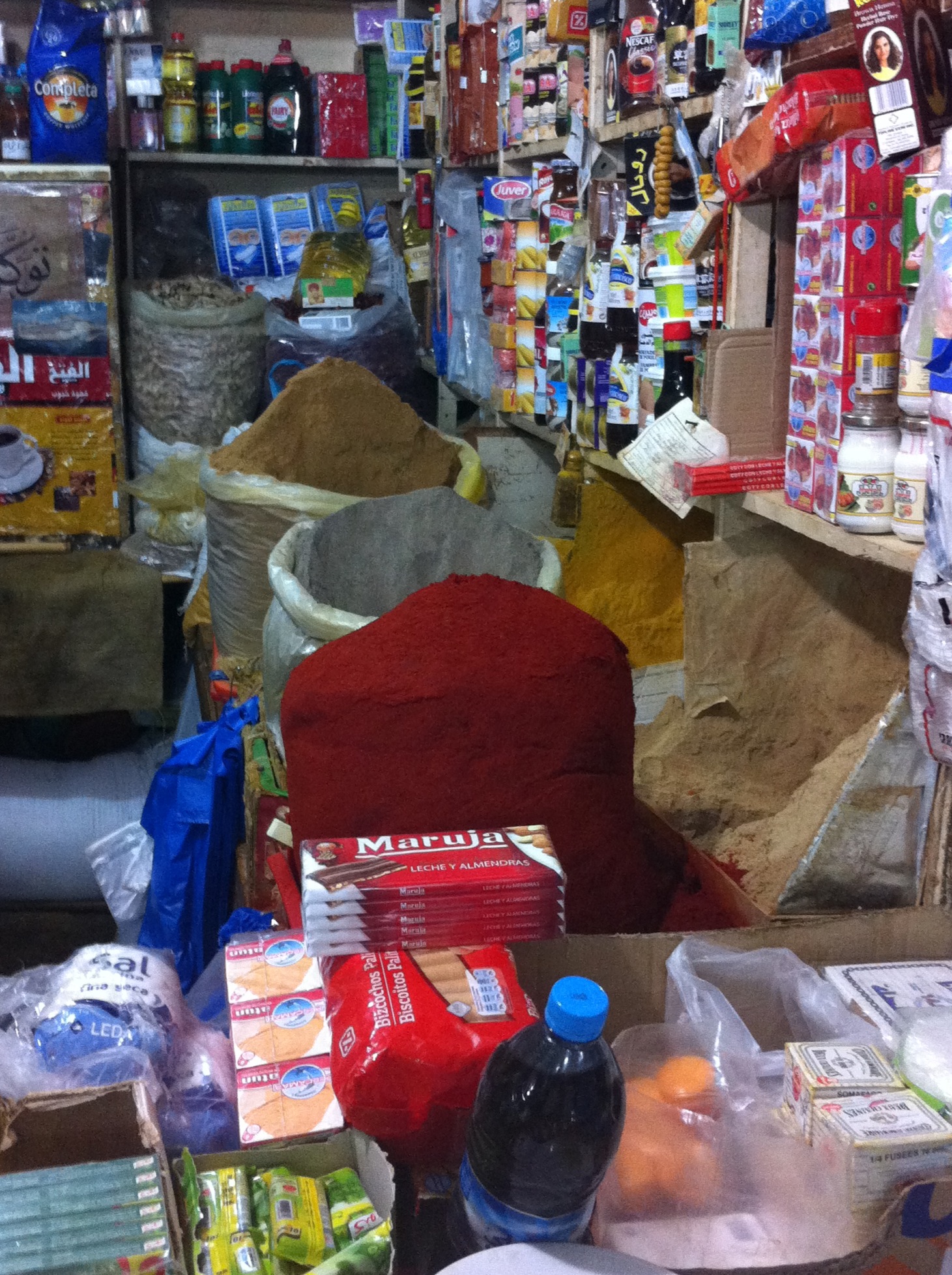 In Nador the zoco almost overwhelms the senses. Colours and smells abound. Huge mounds of unknown spices and unrecognisable fruit, stalls of tat and of treasures, barrels of olives, baskets of dates. Lunch is couscous, as it should be here, in a small back-street restaurant showing a football match between Newcastle and Liverpool while two ten-year olds outside argue over which of them can be Stephen Gerrard in their kick-about. In Nador the zoco almost overwhelms the senses. Colours and smells abound. Huge mounds of unknown spices and unrecognisable fruit, stalls of tat and of treasures, barrels of olives, baskets of dates. Lunch is couscous, as it should be here, in a small back-street restaurant showing a football match between Newcastle and Liverpool while two ten-year olds outside argue over which of them can be Stephen Gerrard in their kick-about. 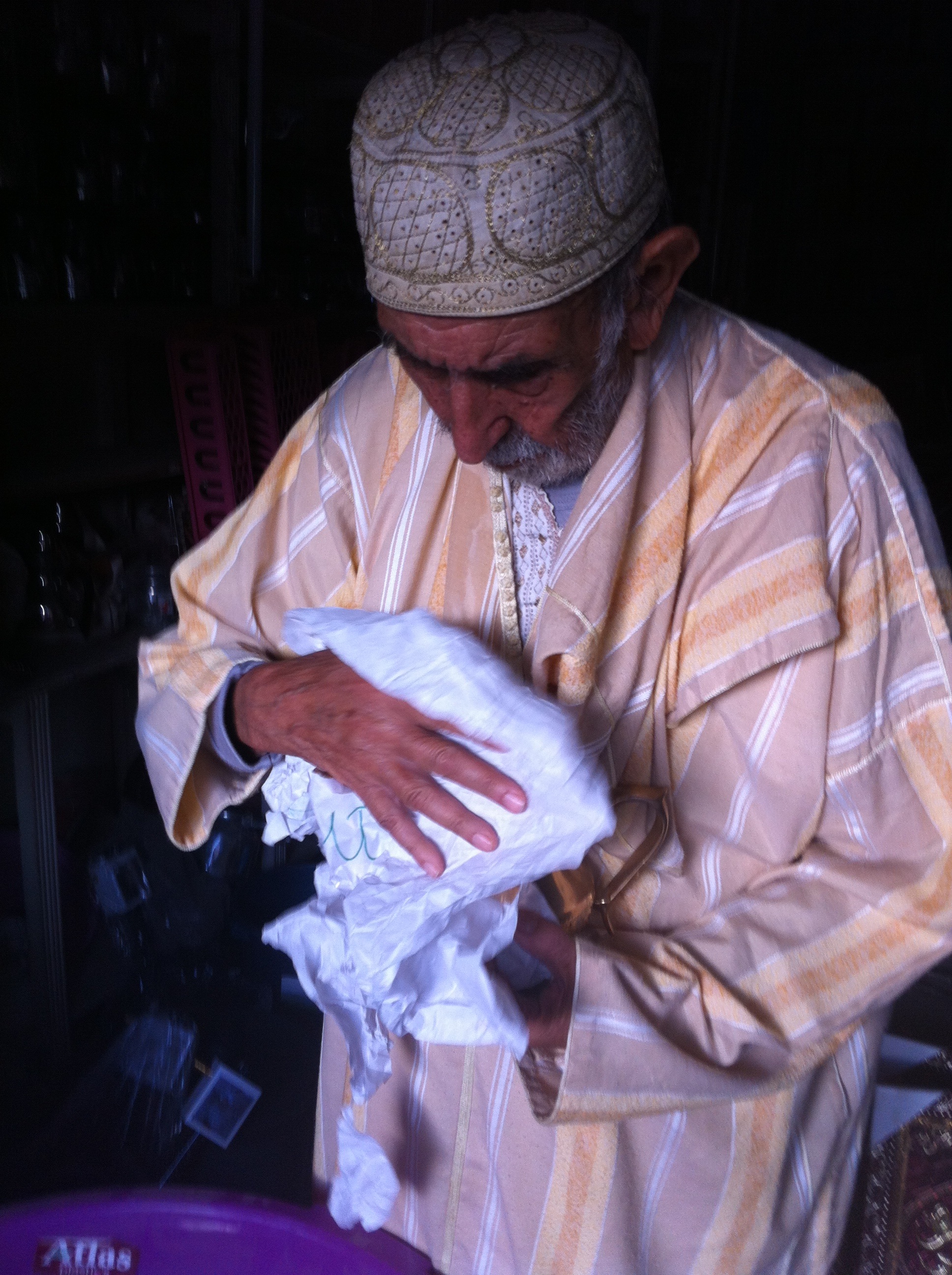 After lunch we return to the tiny shop where an old man was hand-crafting copper teteras. He sneakily adds 20 dirhams to the price he'd quoted that morning. I ignore it and put down 120 as agreed. He mutters something about 14 grandchildren to feed and reaches for the tattiest piece of paper in the known universe to wrap my teapot. After lunch we return to the tiny shop where an old man was hand-crafting copper teteras. He sneakily adds 20 dirhams to the price he'd quoted that morning. I ignore it and put down 120 as agreed. He mutters something about 14 grandchildren to feed and reaches for the tattiest piece of paper in the known universe to wrap my teapot.
Along the 10km journey back from Nador the views are impressive. The road winds between the blue Mediterranean sea on the right and the peaks of the Rif mountains on the left. Not far from the road you can occasionally glimpse camps. Camps of people who have already travelled thousands of miles from sub-Saharan countries such as Mali, Gambia, Cameroon and Ghana, or from Asian countries such as Bangladesh, and have slept in sight of the border for months or even years, desperate to complete the long journey into European territory. 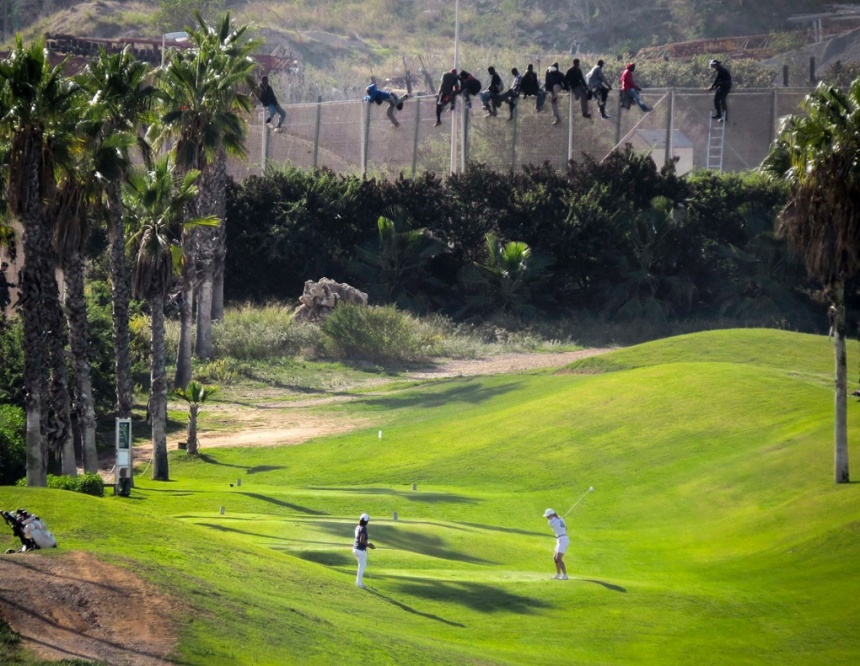 Attempts on the fence can be individual and random, or well-organised and co-ordinated. Weather forecasts are studied - a foggy night in March this year enabled a thousand Malians and Cameroonians to rush the border, despite the new third razor-wire fence and the anti-climbing mesh. Half made it through. There are attempts almost every day (always described as "assaults"). On October 21st 50 people got over using climbing hooks. On October 22nd a further 200 tried, 20 got in, while 70 were stuck for six hours on top of the fence - the stark contrast of their desperate position and the white-clad golfers below led to journalist José Palazón’s photograph going viral. Attempts on the fence can be individual and random, or well-organised and co-ordinated. Weather forecasts are studied - a foggy night in March this year enabled a thousand Malians and Cameroonians to rush the border, despite the new third razor-wire fence and the anti-climbing mesh. Half made it through. There are attempts almost every day (always described as "assaults"). On October 21st 50 people got over using climbing hooks. On October 22nd a further 200 tried, 20 got in, while 70 were stuck for six hours on top of the fence - the stark contrast of their desperate position and the white-clad golfers below led to journalist José Palazón’s photograph going viral.
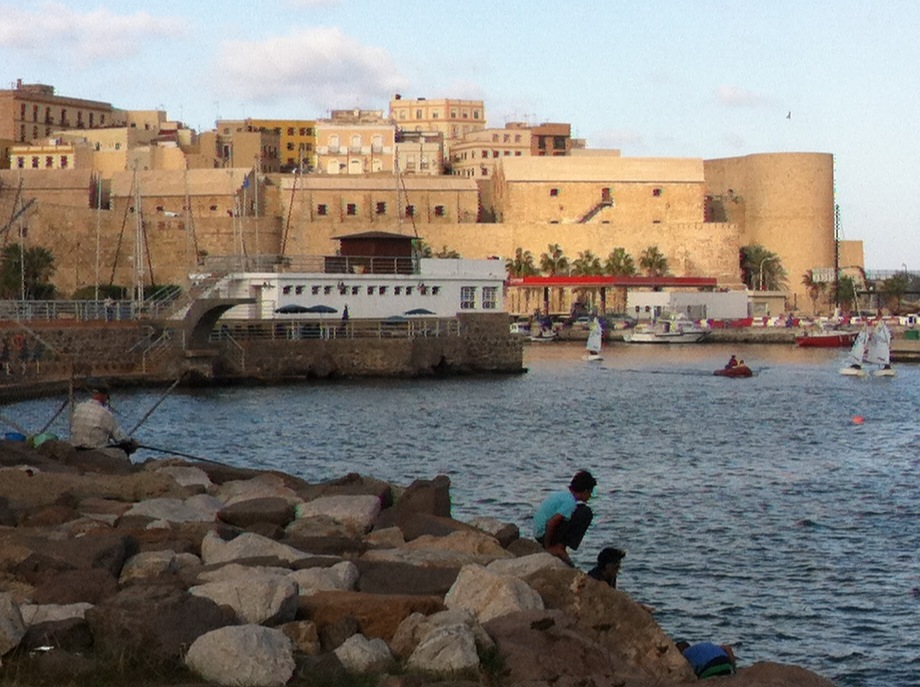 The fence and the border are not the whole story. The city of Melilla is as beautiful as the DVD said. More beautiful, in fact, as the DVD chose to underplay the rich mixture of cultures here - Arab, Jewish, Rif-Berber, Spanish, Hindu - and the variety of architecture (Melilla has fine examples of Spanish Modernista architecture, a Mezquita, a synagogue, a Hindu temple, a walled fortress with deep caves, an art déco Assembly building, and an old African food market). It is a duty-free exclave with great food in wonderful buildings. A fascinating weekend break. But the fence is there, 6-7 metres high, surrounding the city, creeping into the consciousness, and encompassing the experience. The fence and the border are not the whole story. The city of Melilla is as beautiful as the DVD said. More beautiful, in fact, as the DVD chose to underplay the rich mixture of cultures here - Arab, Jewish, Rif-Berber, Spanish, Hindu - and the variety of architecture (Melilla has fine examples of Spanish Modernista architecture, a Mezquita, a synagogue, a Hindu temple, a walled fortress with deep caves, an art déco Assembly building, and an old African food market). It is a duty-free exclave with great food in wonderful buildings. A fascinating weekend break. But the fence is there, 6-7 metres high, surrounding the city, creeping into the consciousness, and encompassing the experience.
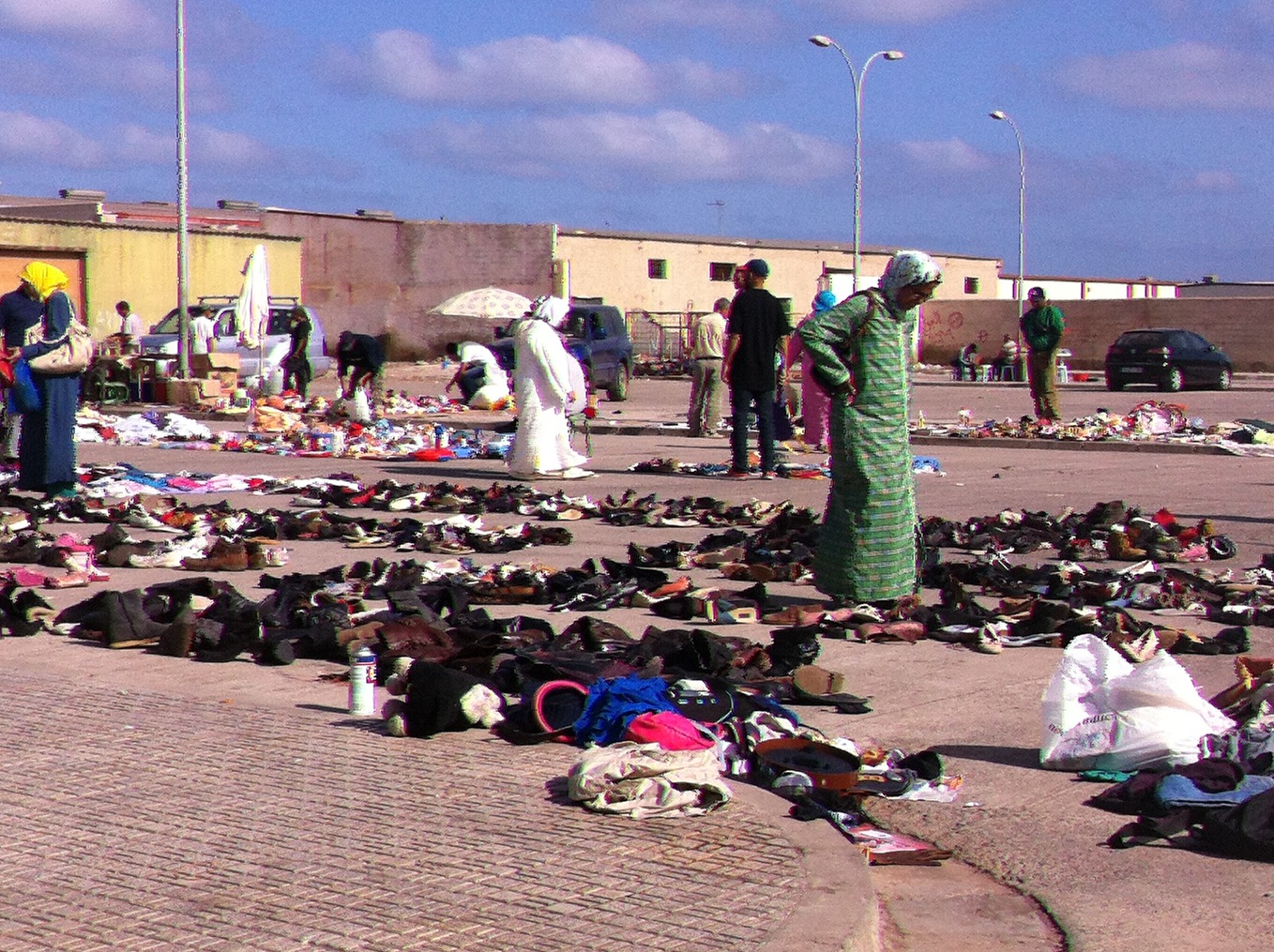 Returning from Nador you try to forget the faces of the people desperate to get onto your taxi, the people laying out blankets of their possessions desperate to sell something or to exchange it for food. People with dreams of escaping misery, starvation, persecution. People desperate to follow you into Spain, dreaming of starting new lives there as you have, desperate to find food and work there. Returning from Nador you try to forget the faces of the people desperate to get onto your taxi, the people laying out blankets of their possessions desperate to sell something or to exchange it for food. People with dreams of escaping misery, starvation, persecution. People desperate to follow you into Spain, dreaming of starting new lives there as you have, desperate to find food and work there. 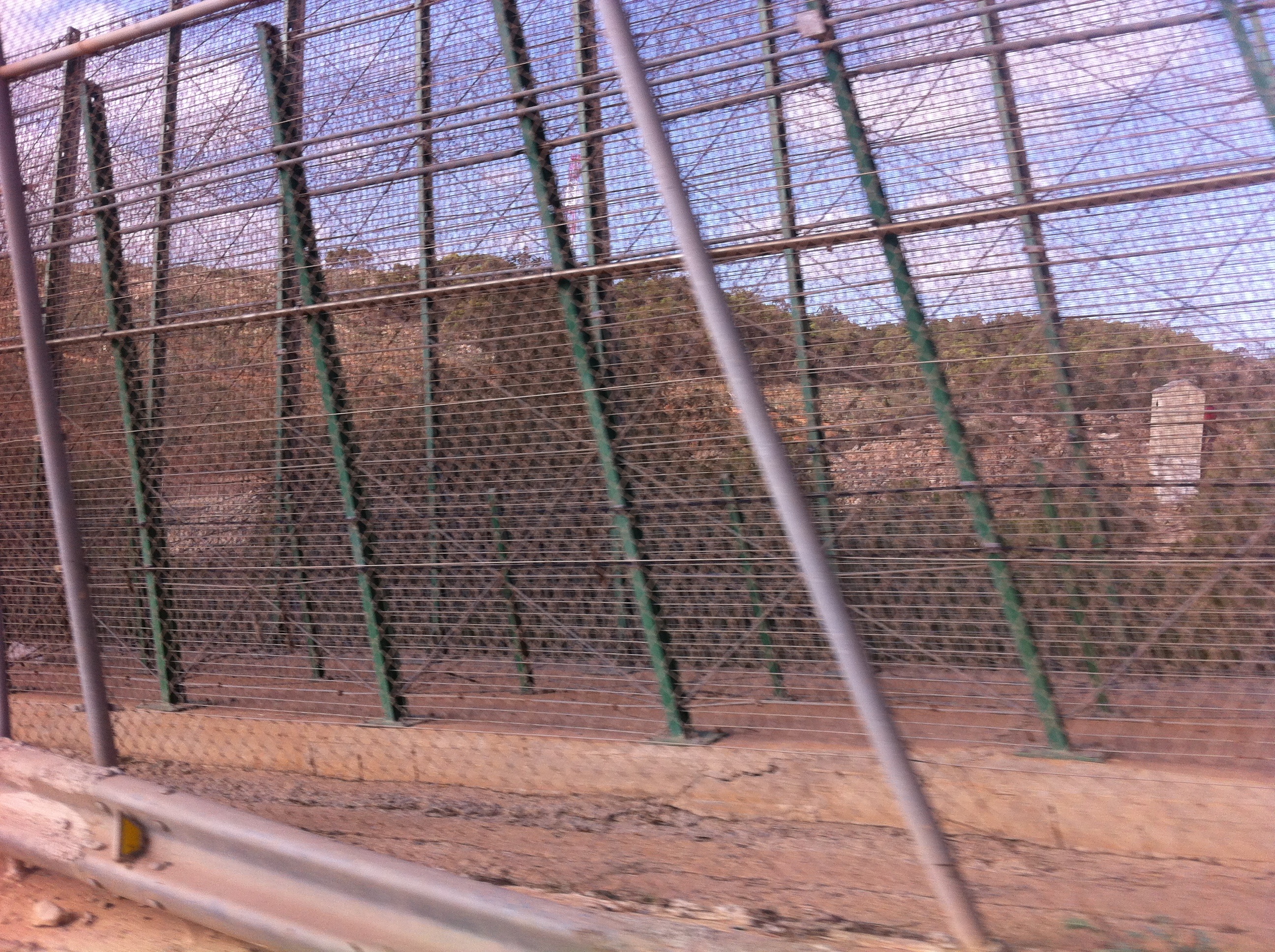 You look the other way, as there's nothing else to do. The taxi driver curls his lip and curses at those clawing at the fence, and we whizz past. Back at the border we are waved through into this odd outpost of Spain with a welcoming smile. A European passport is a thing of enormous value, so easily taken for granted - truly a passport to paradise. You look the other way, as there's nothing else to do. The taxi driver curls his lip and curses at those clawing at the fence, and we whizz past. Back at the border we are waved through into this odd outpost of Spain with a welcoming smile. A European passport is a thing of enormous value, so easily taken for granted - truly a passport to paradise.
© Tamara Essex 2014
http://www.twocampos.com
THIS WEEK'S LANGUAGE POINT:
Firming up lots of conditionals in my mind, as I’m still cramming for the exam which is now THIS MONTH!
If I won the lottery, what would I do?
Daría parte del dinero a los pobres.
Viajaría por el mundo.
Compraría regalos para mi familia y todos mis amigos.
Celebraríamos el premio con mis amigos en un buen restaurante y pagaría todo.
It’s a useful practice exercise, and one that is easy to do in the car or while out walking, as the list is almost endless!
 1
Like
Published at 3:08 PM Comments (7)
1
Like
Published at 3:08 PM Comments (7)
Spam post or Abuse? Please let us know
|
|